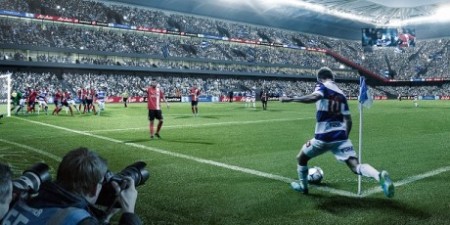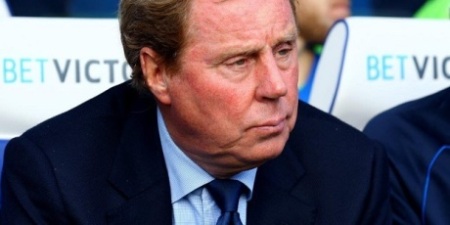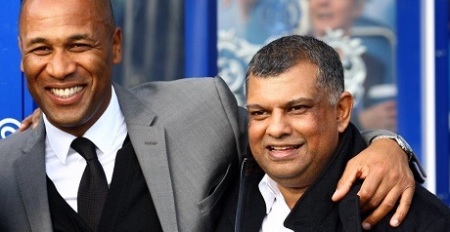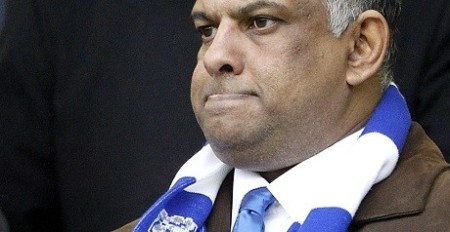My first blog in ages. Mercifully for you, I rarely have the time.
Down but probably not out
I’ve never been one for doomsday scenarios when it comes to QPR. By that I mean that over the course of the 16 years I’ve covered the club, I’ve encountered people at various stages who would have you believe the end is nigh. There have been difficult times during those years, but the extent of Rangers’ financial plight – or at least its impact on the playing side – was massively overstated bar a spell in 2006 when the Monaco-based investors stopped funding the club.
More recently, just as there was the last time Rangers went down, there has been plenty of speculation about the possible financial implications of relegation. My view has always been that QPR are much more likely to face spiritual ruin, through what will evolve into an extremely aggressive rebranding, rather than financial ruin under the current owners, who have access to a truly staggering supply of money.
But no amount of money is infinite, so a meltdown of some kind cannot be ruled out completely while the fecklessness and shambolic decision-making continues.
And at the turn of this year, I felt that if the wheels were to start coming off at QPR, 2015 might be the year.
This was for two reasons: the prospect of relegation back to the Championship – financially worse off, despite two spells in the Premier League – and the Old Oak situation, which is likely to become clearer in the coming months.
Anyone who’s had the misfortune to be subjected to my thoughts on QPR may know that I have always said a lucrative Canary Wharf-style redevelopment is central to the owners’ motives – I wrote this after Rangers’ last relegation, some time before the Old Oak plans were unveiled, when there was speculation about how said owners would react to the club doing down.

By the way, I should add that there are some at QPR who have never liked my Canary Wharf comparison and insist the proposed regeneration would be more comparable to that of the Olympic Park.
Anyway, Rangers’ fate therefore depends largely on events off the pitch as well as on it.
‘As it stands’
On the pitch, everything points to some very challenging times ahead. I know when I say this, there are those on Twitter who aren’t exactly fans of my work who will jump up and down saying I predicted that Rangers would be relegated from the Championship the last time they went down.
This is based on a remark I made on Twitter two years ago. Let me explain a bit about that and why it’s relevant to the current situation.
When Mark Hughes was manager and QPR were in danger of going down – they of course ended up staying up on the final day – there was a belief within the club that if the worse happened, they would simply “do a Newcastle”. By that they meant keeping the bulk of the squad and storming the Championship with players who were, certainly on paper, too good for that level.
Based on the toxic atmosphere in the dressing room at that time, which has since become well documented, I was absolutely convinced that approach would see Rangers fall straight through to League One, and I still believe they would have finished bottom of the Championship the following season had they gone down under Hughes.
A year on from that final-day survival, this time with Harry Redknapp as manager, again there was a belief inside the club that they could “do a Newcastle” and bounce straight back. It was this specific view I was responding to when I replied to a tweet by saying that as it stood Rangers were absolutely certain to go down. And they were.
I also added to those who pressed me on the issue that I might well revise that view a week or two later following planned discussions between Redknapp and the board.
Redknapp’s finest hour
Many QPR fans dislike Redknapp intensely and blame him for this shambles of a season. And rightly so.
But, say what you like about him, he is an experienced football man who understood Rangers were heading for disaster under the “do a Newcastle” strategy and he managed to persuade the powers-that-be significant changes needed to be made or another relegation was on the cards.
In many ways things swung too far in Redknapp’s direction over the course of last season and beyond. He wasn’t kept in check and that had negative repercussions.
However, forget Wembley or any of his better signings, Redknapp’s greatest achievement as QPR manager occurred off the pitch, in important meetings after relegation. There, he succeeded where Hughes would have meekly failed had relegation happened 12 months earlier.

I still get plenty of stick for the “as it stands” tweet and it’s mostly good natured. But it ignores the fact that in the following days and weeks:
- The club stepped back from its original post-relegation strategy and Redknapp was given the green light to make crucial changes
- Original plans for ticket prices were amended following consultation with fans groups, who played a blinder. Never underestimate how these things have a huge impact on the vibe around Loftus Road and its effect on the team and results
- A pre-season trip to South Korea was also scrapped. I had always put the relegation in large part down to a foolish and ego-driven pre-season tour of Asia, which Hughes did not want and which had a seriously detrimental impact on the early part of the season
- Steve Cotterill was replaced by Steve McClaren
Given all that, my “as it stands” comment soon became obsolete.
Incidentally, when asked a few weeks later for my prediction for the coming season, I said play-offs.
For those who like me to be wrong, privately I thought the most likely outcome would be that Rangers would totally bomb in the play-offs and a hugely unpopular Redknapp would leave under a cloud, leading to some serious soul-searching about where the club went from there.
Obviously I couldn’t have been more wrong. I do think though that QPR would be in a healthier position now had that soul-searching happened last summer rather than this. But try telling that to the thousands of fans who experienced that last-minute Zamora goal – few football fans will ever taste something like that.
Be careful what you wish for
So why is a debate that took place two years ago relevant now? Because this time around, there isn’t a manager who isn’t on-message with the owners’ vision for the following season, so the roadmap being drawn up is for keeps.
That isn’t a criticism of Chris Ramsey, Les Ferdinand or indeed the owners. It’s a fact based largely on the situation Rangers are in. There’s simply less room for disagreement this time. The realities of another relegation and Financial Fair Play to a large extent dictate where they go from here.
Their basic approach, which is to batten down the hatches and prepare for a season in which Rangers will do well to finish mid-table, is exactly the right one. It should be seen as a positive thing and a sign of sense prevailing – or least having a chance to prevail.
And if some smart decisions are made, it could be the platform for Rangers to rebuild and rebuild properly this time.
But it’s fraught with danger.
Ramsey and Ferdinand have done some good things. But they have also played behind-the-scenes politics on the important issue of the club’s youngsters, convincing Tony Fernandes there’s a potential harvest approaching when there is in fact at least a few more years of drought.
This had the effect of undermining Redknapp’s position and strengthening theirs as Fernandes sought a new direction and a new message to fans, with the ‘lessons learned’ mantra having been seen for the hollow nonsense it was.
With fans now calling for youngsters rather than big-name signings, Fernandes has new platitudes to trot out.
Youngsters playing was what Tony wanted all along, by the way. While he was locked in a cupboard for four years as his egomaniac twin brother insisted on the opposite approach.
Without being too critical of young players and making this blog even more long-winded than it’s becoming, here’s a sobering thought as QPR head back to the Championship: Fulham have one of the best academies and some of the best young players in the country and they almost got relegated – and that was with a seasoned striker in Ross McCormack.
That highlights what could lie ahead for a club that’s convinced itself Redknapp refused to give talented youngsters a chance, despite his track record showing the exact opposite. Few managers are more enthusiastic about blooding youngsters if they’re in any way good enough.
For Rangers, simply having youngsters who can see out a loan spell at lower-division clubs has been an important step in the right direction in recent years. That’s how bad things had got. Steve Gallen has done brilliantly with what he’s had.
Show me your list and I’ll show you mine
As well as looking to their youngsters, Rangers know they will need to buy sensibly from League clubs – something they should have been doing anyway.
Fernandes’ factually-ropey narrative of the last few years is that he was taken for a ride by certain people, mainly agents, and that he has learned lessons. But with a director of football with no experience of the area of the transfer market that Rangers will need to deal in, doesn’t that mean they are again at risk of being steered by agents?
No, Fernandes insists. When I asked him about this potential issue some time ago, he gleefully pointed out that the club has a list of players in the Championship and League One they might pursue.
Herein lies the major problem. The chairman doesn’t understand football and is far too easily swayed by things he finds impressive. Everyone at all levels of the game has a long list of players. Everyone. It means nothing.
Les on the spot
Regardless of Fernandes’ reasons for appointing a club legend to the crucial role of director of football – without a proper procedure to find the right person for QPR rather than indulge the chairman’s latest whim, needless to say – Ferdinand as Johnny-on-the-spot means business, has really got his teeth into the role and is serious about improving the club.
He could yet turn out to be brilliant and his lack of experience in some areas needn’t be a problem, as part of his role involves bringing the right people in and overseeing their work. He is keen to appoint a chief scout/head of recruitment, for example.

But the main lesson that needs to be learned from the Rangers debacle is that there is so much more to getting things right than signing good players and having a good manager. And QPR have had good managers, despite how they may have come to be perceived.
Fernandes spoke of “culture” when he brought Ferdinand in. He has no real idea what club culture means, he just knows the fans are talking about it. A handful of people who understand the inner workings of QPR and the issues at play have been using the word culture for years, it’s only recently that it’s caught on.
At Rangers, that culture is unfortunately one of shoddiness and a lack of professionalism and pride in the club as an institution. And that stems from the top.
Ferdinand saw this immediately and saw that the starting point for addressing this cultural problem would be for the chairman to change the way he conducts himself, particularly on Twitter.
But Fernandes wasn’t having any of that and Ferdinand was duly slapped down. Culture’s great as a buzzword, but that’s as far as it goes, it seems.
If Ferdinand isn’t allowed to change the fundamental reasons QPR is a circus, it’s hard to see how he can do his very important job without being compromised.
Fernandes rejects any suggestion that his social media activity is linked to the club’s problems, or that his star-struck behaviour has contributed to a series of players under-performing for QPR when they have performed well elsewhere. So do many fans. I know from experience that a great many totally dismiss any suggestion the current mess on the pitch is not only caused by events off it, but caused by events that occurred a decade ago.
It’s a 2005 thing
Something happened to QPR in 2005 that changed the face of the club. The fall-out from Gianni Paladini’s boardroom coup and his subsequent purging of much of what made the club tick is the single biggest reason for the years of chaos and instability that Rangers, once a respected club, is now synonymous with.
This chaos was well documented under Flavio Briatore (eventually – it took a while for that particular media bandwagon to gain some momentum), but only because he and Bernie Ecclestone had a higher profile than Paladini and the previous de-facto owner, Antonio Caliendo.
It was often said the Briatore-led takeover of 2007 led to QPR losing its soul. My mantra during that era was “It’s a 2005 thing, not a 2007 thing”, and the same applies now. Fernandes has been a disaster since becoming chairman in 2011 but in many ways he is not the cause of QPR’s problems, he’s a product of them. It’s a 2005 thing, not a 2007 or 2011 thing.
Above, I suggested that the big lesson to be learned is that there is so much more to being successful than having good players. It’s why I said with complete confidence that Rangers’ big-name signings would flop.
The current mentality is more or less what Paladini called “The Italian Way”. Broadly speaking that approach sees doing deals and getting players as all that all really matters – everything else is just window dressing and is dispensable.
Briatore and Fernandes have both since made noises about building, sustainability, culture and numerous other buzzwords. And in fairness, some of what Fernandes has talked about doing he would genuinely like to if he could only get beyond the endless firefighting needed because of his previous short-term firefighting – a cycle QPR just can’t escape.
But fundamentally, since 2005 the club has remained in the trap of believing that if they could just get this player, or that manager, the tide will turn. Classic “Italian Way” thinking. Rangers just can’t shake it off.
No standards = no chance
Over time, it’s become the majority rather than derided view that Rangers weren’t equipped to make big-name signings, were signing the wrong characters and were being foolish. That debate’s finished, it’s time to move it on a step.
Signing the right characters is important. I’ve argued that more than anyone. But – and this is where the real soul-searching comes in – it’s not just about type of characters the club bring in, it’s about what kind of club they walk into.
Sadly the answer to this question is a large part of the reason why so many signings that seemed fantastic on paper have been so dismal. Some have been “bad eggs”, but for some the fire has simply gone out. And the brutal truth is that it’s gone out for a reason.
It’s not just about whether they’re “bad eggs”.
What kind of club are they joining when they join QPR?
What kind of standards are imposed?
Who reminds them of their duty as QPR players?
What happens if they let the club down?
What sense do they get of the history and tradition of the club and its importance?
What happens if they bring the club into disrepute?
And, based on the answers to all those, what do they think of QPR compared to their previous clubs?
The answers not only explain the performances on the pitch over a long period of time, they’re also linked to the Paladini purge I’ve referred to. And they’re linked to the way the current chairman conducts himself too.
This view is sometimes dismissed as harking back to the days when QPR weren’t so cash-rich. It’s not that, because the rot set in during the two years before the billionaires arrived.
Other clubs that came in to money had people at the door to welcome new owners or investors, to tell them about the club and what it stood for, and that’s been reflected in how those clubs have managed to build. Because of the Paladini purge, QPR didn’t have this. Subsequent owners inherited a club that had been torn apart, was down on itself and had no credible ethos or sense of direction.
The fallout means that, 10 years on, there’s a chairman talking about culture without really knowing what he’s talking about, unable to put his finger on why it’s gone wrong despite all that’s been thrown at the project.
I’ve taken some stick for being dismissive of Rangers’ chances of making their money work for them. But while a club can spend enough and paper over their shortcomings enough to eventually get it right in the Championship, which Rangers have now done twice, the Premier League is a different kettle of fish.
For all their money, QPR simply cannot compete with medium-sized clubs who have what Rangers had before the Paladini purge; spirit, a coherent plan, pride in itself, high standards – and most of all, decision makers and other influencers who live, breath and love their club and have its best interests at heart.
That’s the culture players and managers who join those clubs are expected to buy into. It’s a world away from the culture at QPR.
What lies ahead?
Going forward, Old Oak remains the key issue. More on that another time. On the pitch, Ramsey, who is due to be confirmed as manager in the next week or so, will face some tough months. His appointment won’t please everyone, but it will at least give Rangers some continuity.
With Ferdinand in place, Rangers paving the way for Tim Sherwood (Ramsey, despite his initial role, was earmarked as Sherwood’s assistant) only to not appoint him made things tricky. Taking Ramsey out of the picture too would make things downright messy at a time when things are messy enough.
As for Fernandes, a number of factors mean it now make senses for him to stand aside, either formally or informally, for the time being at least.
The ball has already been rolling in that respect, with Ruben Gnanalingam, who despite his lower profile is very much the main man in financial terms, having an increasingly prominent role behind the scenes.

These things are almost always determined by events, and the events of the last few years speak for themselves.
Plus, there is a potential event on the horizon which I think could seriously undermine Fernandes’ credibility even among the many fans who still believe in him, and that is the possibility of QPR’s academy being downgraded to Category Three status.
The current status was determined largely on the basis of the club giving various assurances and outlining ambitious future plans (fans aren’t the only ones given the spiel).
But their bluster may not be enough to get them through a re-audit which was due to take place this month, although it has been deferred. If it’s delayed long enough, say until September, it may be that Rangers are simply allocated Category Two fixtures for next season and therefore buy themselves more time.
Otherwise, a drop to Category Three, which would see QPR’s youngsters in the same league as the likes of Leyton Orient and Southend, after four years of Fernandes’ grand promises, would be difficult even for him to explain away.
He could try, perhaps arguing that progress has been made on plans for a training ground at Warren Farm and therefore that a short-term step backwards is unimportant because possible Category One status is closer.
But it could be a tough sell, even for Fernandes, the ultimate salesman, given that he has placed so much emphasis on building the academy, made so many promises about it that have bought him time and goodwill and given him a bigger-picture narrative to sell to fans, enabling him to constantly deflect criticism despite the shambles that’s occurred on his watch.
In any case, with QPR preparing to batten down those hatches, and accepting that this relegation is more damaging than the previous one, Fernandes’ frontman role as hype generator and face and voice of the club’s owners has perhaps simply run its course.
Given the events of the last four years and the challenges that lie ahead, the quieter approach favoured by Ferdinand and Gnanalingam is called for now.
NB: I should add that in 2005 Rangers were already dealing with serious problems, so certain issues in fact date back further than that. It’s also the case that Paladini invested in 2004 after others had merely talked a good game, and that this money, followed by that of the Monaco-based investors he brought on board, kept the club stay above water. However, in 2005, a year after promotion, having replaced the previous board from the Chris Wright era and consolidated in the Championship, there were certainly challenges but also a genuine platform from which to build and get Rangers on a solid footing. So the events of that year were very significant and the consequences stark.



 Posted by davidmcintyre
Posted by davidmcintyre 


